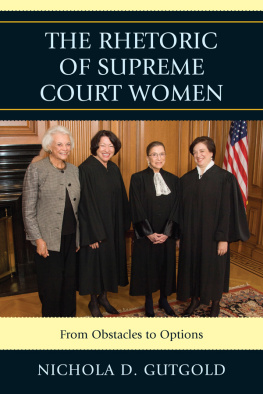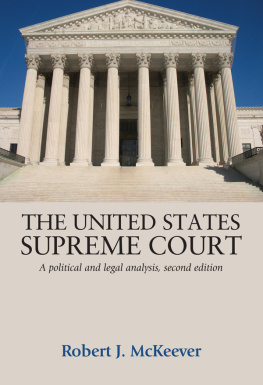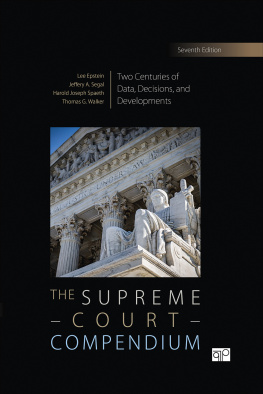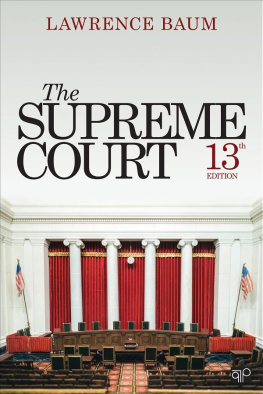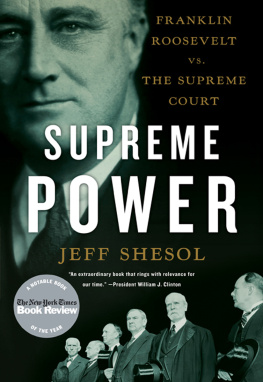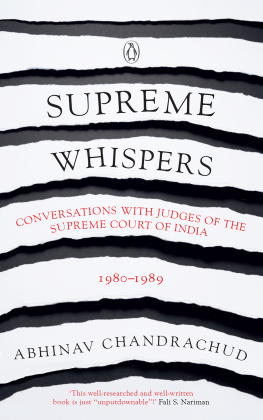ROBERT G. MCCLOSKEY (191969) was professor of government at Harvard University. He is the author of American Conservatism in the Age of the Enterprise. SANFORD LEVINSON is the W. St. John Garwood and W. St. John Garwood, Jr. Centennial Chair in Law at the University of Texas Law School and professor of government at the University of Texas at Austin. He is the author of several books, including, most recently, An Argument Open to All: Reading The Federalist in the 21st Century.
The University of Chicago Press, Chicago 60637
The University of Chicago Press, Ltd., London
1960, 1994, 2000, 2005, 2010, 2016 by The University of Chicago
All rights reserved. Published 2016.
Printed in the United States of America
25 24 23 22 21 20 19 18 17 16 1 2 3 4 5
ISBN-13: 978-0-226-29675-3 (cloth)
ISBN-13: 978-0-226-29689-0 (paper)
ISBN-13: 978-0-226-29692-0 (e-book)
DOI: 10.7208/chicago/9780226296920.001.0001
Library of Congress Cataloging-in-Publication Data
Names: McCloskey, Robert G. (Robert Green), author. | Levinson, Sanford, 1941 editor.
Title: The American Supreme Court / Robert G. McCloskey; revised by Sanford Levinson. Other titles: Chicago history of American civilization.
Description: Sixth edition. | Chicago : The University of Chicago Press, 2016. | Series: Chicago history of American civilization | Includes bibliographical references and index.
Identifiers: LCCN 2015044534 | ISBN 9780226296753 (cloth : alk. paper) | ISBN 9780226296890 (pbk. : alk. paper) | ISBN 9780226296920 (e-book)
Subjects: LCSH: United States. Supreme CourtHistory. | Courts of last resortUnited StatesHistory. | Constitutional historyUnited States.
Classification: LCC KF8742 .M296 2016 | DDC 347.73/26dc23 LC record available at http://lccn.loc.gov/2015044534

This paper meets the requirements of ANSI/NISO Z39.48-1992 (Permanence of Paper).
ROBERT G. McCLOSKEY
THE AMERICAN SUPREME COURT
SIXTH EDITION
REVISED BY SANFORD LEVINSON
THE UNIVERSITY OF CHICAGO PRESS
Chicago and London
THE CHICAGO HISTORY OF AMERICAN CIVILIZATION
Daniel J. Boorstin, Editor
To My Wife
R. G. McC.
To My Grandchildren, Rebecca, Gabriella, Sarah, and Eli
S. L.
CONTENTS
PREFACE TO THE SIXTH EDITION
I begin this preface with the opening words of my preface to the first revised edition in 1994: This is literally a labor of love, to reflect my abiding affection, even almost a half century after his premature death in 1969, for Robert G. McCloskey. He was my Ph.D. supervisor when I was a graduate student at Harvard and, far more important, was everything a mentor should be. It is, though, not only my respect for the memory of a wonderful man that has led me to revise his book in the specific manner that I have. The American Supreme Court is justifiably regarded as a classic, as signified by the fact that even the 1960 edition remained in print, and continued to be assigned in courses, well after most books published at that time had been consigned to the remainder heap. It not only presents a remarkably concise descriptive overview of the history of the Supreme Court, it also clearly articulates a particular normative view of the role best played by the Court within the American political system. Though McCloskey may be a voice from the past, he spoke to concerns that certainly remain as we stride further into the twenty-first century.
This accounts, then, for the basic decision that I initially made more than twenty years ago and continue to adhere to, to add to, rather than genuinely revise, his book. The first seven chapters, therefore, are exactly as he wrote them at the end of the 1950s, save for the silent correction of a very few factual errors and, more important, different titles for insofar as McCloskeys version of the modern court and modern America is now more than a half century old.
I certainly do not want to suggest that I would not press for some changes in McCloskeys own arguments were this a genuinely coauthored work. Inevitably, both developments in disciplinary scholarship and generational shifts in overarching perspectives would lead to differences in approach. An example of both, probably, is that I would focus much more on slavery as a dominating issue of the Supreme Courts first seventy years, rather than treat it simply as one aspect of the controversies, important as they were, about federalism. And I have a somewhat different view of John Marshall. McCloskeys romanticized view of this chief justice was partly shaped by his being, having been born in 1916, a product, in important senses, of the Great Depression and the New Deal response. An important part of New Deal judicial theory was the theme that Roosevelt simply wanted to return to Marshalls broad and capacious nationalist vision, almost unaccountably hijacked by Republican conservatives at the turn of the twentieth century. I see far less continuity between Marshall and the New Deal and am inclined to accept Yale law professor Bruce Ackermans view that the Constitution was fundamentally amended, even if outside Article V, by the developments that we associate with the New Deal.
Were this entirely my own book, moreover, I would spend some pages on the Courts role in the saga of American expansion by which the United States was transformed from a nation of eleven Atlantic coast states at the time of Washingtons inauguration in 1789North Carolina and Rhode Island had not yet ratified the Constitutionto a country of fifty states, one of them in the mid-Pacific, not to mention assorted colonies the most important of which is certainly Puerto Rico. Even if the Court, as a matter of fact, played no significant role in the most important single event of this transformation, the Louisiana Purchase of 1803, it played a major role in legitimizing the new legal order that characterized the relationship with American Indians in the late nineteenth century and the control exercised over the new American Empire in the early twentieth century.
And there are surely other differences as well. One of them involves the role that McCloskey implicitly assigns to the Court as the primary agent of American constitutional development. No one can deny that the Court has played a significant role. But it is important for students to be aware of what has come to be called the Constitution outside the courts. As political scientistlawyer Mark Graber has demonstrated, Alexis de Tocqueville was wrong insofar as he suggested that Americans tend to turn all issues into judicial ones. He may have been correct that Americans tend to view political issues as legal ones, but the primary venue for much constitutional debate, especially in the nineteenth century, was Congress, not the Supreme Court. Congress may well play a less central role today as a serious constitutional interpreter. However, for anyone aware of constitutional arguments in the twenty-first century, it is obvious, for example, that the Office of Legal Counsel within the Department of Justice may well be at least as important as the Supreme Court with regard to such contemporary issues as the scope of presidential power in administering the modern administrative state or, even more dramatically, in making crucial decisions, sometimes literally of life and death importance, with regard to foreign or military policy. Still, even if students should become aware that other institutions besides the American judiciarynot to mention mass political movements like the civil rights movement of the 1950s and 1960s; the New Right that developed in the 1970s and 1980s in part as a response to the Courts decision in

 This paper meets the requirements of ANSI/NISO Z39.48-1992 (Permanence of Paper).
This paper meets the requirements of ANSI/NISO Z39.48-1992 (Permanence of Paper).
